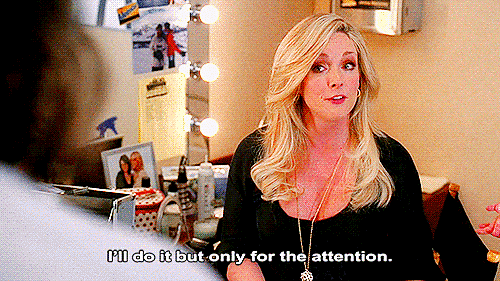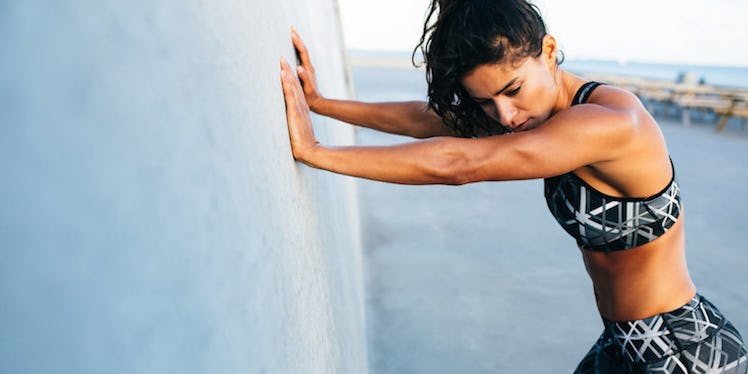If you don’t post your six-pack abs to Instagram, do they even really exist?
Does your green juice sum up who you are as a person in one bottle?
Years ago, sweat sessions and sleek, defined quadricep muscles belonged to the gym, the dance studio and the running trail near your home.
Now, it seems as if escaping our workout-obsessed culture is not only impossible but also improbable.
Perhaps this is all because our cultural motivation for fitness has become skewed.
In the age of social media, you don’t lift, jump or squat for the burn; we do it for the ego boost.
Fitness should be a focus on you and your dedication, but when we talk about "fitness," often we're talking about vanity.
Now, hear me out: I’m a fitness lover and avid gym goer. I’ve ever posted a #fitspo photo, but then again, I’ve never had the body of Jillian Michaels.
Exercise, like everything else, is an act of mindful balance in my life.
It shares priority status with my career, my relationships and my personal responsibilities.
Overwhelmed by the Instagrams, advertisements and expectations for our bodies, our fitness mindset and definition of what it means to be "healthy" has been tangled.
The way we workout should be a personal choice, not an added layer of societal pressure mandated by expensive private studios.
Is our obsession with "healthiness" even healthy?
Social media validates every workout.

After a long, hot yoga session, there’s no better feeling than snapping a selfie – droplets of sweat included – and composing a blurb about your workout.
Dozens of friends double-tap and it hits your brain’s reward center like imagined pats on the shoulder.
It doesn’t matter nearly everyone gives a courtesy “like” to the photos of their peers and friends; all you feel is pride.
So the selfies keep coming. You attend Barry’s Bootcamp, and check-in on Foursquare to receive virtual validation by making sure everyone knows you're working out.
You run on a Saturday morning, tagging your photo #WillRunForJuice in an effort to take advantage of a juice bar discount to make your ex jealous.
Sweat, shower and repeat.
Soon, no happy hour is complete without a comparison of calories burned.
Instead of finding the inner strength to keep pushing toward your fitness goals, you rely on getting a boost from forces outside of yourself.
Old habits shouldn’t always have to die hard.

There is life outside of ClassPass, a fact that might be surprising to some.
This is not to bash fitness, which is an excellent way to live longer and boost health.
But, when fitness means shying away from family dinners for fear of ruining your diet or ditching old friends in favor of those who attend the same barre class, it’s become problematic.
Working out should mean cardio-kickboxing to Beyoncé with joy in your heart, sweat aross your cleavage and a fierce light in your eyes.
It’s not about hitting the gym at 11 pm to sneak in an obligatory second squat session, alone and missing out on a friend’s birthday.
There might be an “I” in “exercise,” but it doesn’t mean you have to do it alone.
Instead of bragging about your biceps on Twitter, take the chance on a new class with a friend.
Keep your mind present, and put the iPhone away.
Sweat, don't stress.

Everyone wants to be “fit,” but the definition of the word has certainly changed.
Fitness might have once dealt with the physical health of the body, but it doesn't make it synonymous with a certain body shape. Instead of appreciating the internal benefits of regular workouts, we've become too focused on the way a fit person should look.
The toned, gym-package body has become this year's most acceptable shape, excluding everyone, especially people who may be fit but don't fit the chiseled mold.
Fitness is different for everyone. It doesn't need to come with a sign-up sheet and "after" photo.
Exercise doesn’t define you, no matter what gym marketing campaigns might suggest. Staying active is a must for cardiovascular health, but “getting fit” and “eating clean” are acquired tastes -- adjectives to describe a personal regime.
Those who would rather take a long walk than take a burpee challenge shouldn't be shamed or considered any less successful for their choices.
Strength doesn't have to mean muscle.
It's easy to get mired down in the feel-good mantras of influential workout gurus and cult-like schools of fitness, an idea already expertly lampooned by Netflix's "Unbreakable Kimmy Schmidt."
But what's important to remember is this: There are more ways to confident and beautiful than by completing three weighted-arm circuits a day.
Strong women sit behind desks in offices, they care for families and go out with friends.
SoulCycle is a great tactic for burning calories and feeling a competitive rush, but it's not the only way to feel good about yourself.
Even if you can't bring yourself to go on a run, you can still own the rest of the day.
The truth is this: Fitness is a necessary part of life, but it's not the only cause worth your time and attention.
It's just one piece in a large, complex balancing act.
And the actual word, "fitness," doesn't just describe the girl with a ponytail running seven miles on the treadmill.
It's a spectrum including humans of all shapes and sizes, strengths and weaknesses, working on their inner-endurance.
There's no selfie that can capture that.
